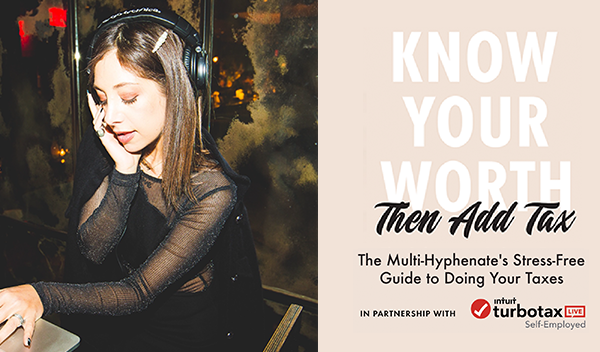Many turned to self-employment in the wake of the pandemic. People jumped into everything from being online merchants to content creators and influencers on platforms like TikTok, OnlyFans, and Instagram. If this is you, you may be wondering, “Now that I am making money from my self-employed business, how can I save money on my taxes?” and “What are some self-employed expenses I can deduct?”
To help you uncover tax write offs specific to your business, we created a fun and engaging Self-Employed Tax Deductions Interactive Calculator that will help you uncover self-employed tax deductions to help you save on your taxes whether you are a dog walker or a content creator. Our calculator allows you to select your specific self-employed industry (over 30) and discover what self-employed business tax write-offs and expenses you can deduct as a 1099 independent contractor or freelancer, so you don’t leave any money on the table.
When you are ready to file your taxes, TurboTax Premium will guide you and search for industry-specific deductions that you may not even know about. You can come to TurboTax and meet with a TurboTax expert who can do your taxes from start to finish.
Below is more information regarding the TurboTax Self-Employed Tax Deductions for some of the most popular careers.
Rideshare
Working as a rideshare driver for Uber or Lyft (and others) has tremendous tax advantages related to tax deductions for business use of your car, like the standard mileage deduction, which is 65.5 cents per business mile driven in 2023, but leveraging all deductions is key to maximizing your refund.
Furthermore, common expenses that can be used as deductions include vehicle cleaning, passenger goodies, maintenance, parking and tolls, and more. If you spend money on your car while working in a rideshare capacity, save receipts and track all expenses in addition to mileage if you don’t claim the standard mileage deduction because you may be able to deduct them from your income, lowering your taxes. Review our Tax Tips for Uber, Lyft and Other Car Sharing Drivers for more in-depth information.
Contractor
If you work as an independent contractor where your income is recorded on 1099’s, you have quite a few options when it comes to tax deductions. Common deductions include travel expenses, home office, and supplies, while lesser-known deductions include retirement plan considerations, medical plans, and cleaning services. Use our self-employed calculator, and choose your most relevant job type to see the top deductions you may be eligible for.
Real Estate Agent
As a real estate agent, writing-off your related business expenses can make a significant difference in lowering your taxes. One of the biggest areas to consider is maximizing tax deductions for the business use of your car. Taking the standard mileage deduction is usually the best option, but for some, the actual cost method works in their favor when the miles count is low.
In addition, gifts are given a lot in real estate, which also qualifies for a deduction. The IRS stipulates no more than $25 per recipient can be deducted. Marketing expenses such as advertising will make an impact as well. Finally, it’s good to understand that commissions from sales are not tax-deductible unless you pay them to another agent on your team, but you can deduct broker fees.
Caregiver
If you are working as a Caregiver, you are most likely driving from your home to another location to take care of someone, and the business use of your car can be one of your biggest expenses. You will either be able to take the standard mileage deduction (65.5 cents per business mile for 2023) or deduct your actual car expenses like gas, repairs, and maintenance based on your business use, whichever is more. Make sure you keep track of your mileage driven and your actual expenses so that you can deduct your maximum expenses you’re eligible for. Some other expenses you don’t want to forget are uniforms, personal protective equipment (PPE), advertising, and cleaning supplies, to name a few.
Sole Proprietor
Overall, as a sole proprietor business be aware that self-employed tax deductions should be a priority. Some top-level categories of expenses to always track are supplies, home office, bank fees, business meals, internet, utilities, legal, and professional services. In addition to expenses from your self-employed business, personal expenses like charitable deductions or mortgage interest can be deducted as itemized deductions on your personal taxes as well. Get started planning for tax season with our Beginner’s Tax Guide for the Self-Employed.
Tutor
You may be wondering if tutoring makes you self-employed. It depends on whether you are employed by a company as a tutor or if you started a tutoring business on your own with the intent to make money. If you did start a tutoring business on your own with the intent to make a profit, you would be considered self-employed. When you are self-employed, you will have to think about self-employment taxes if your net income is $400 or more, and you also may have to pay estimated taxes since you don’t have an employer to withhold taxes from your pay; however, there are so many expenses you can deduct related to your tutoring business to lower your taxes. If you are a tutor, keep track of your expenses like advertising, supplies, home office, and mileage to travel to tutor your clients.
Consultant
Consultants have many options when it comes to tax deductions. When setting up your business, the upfront costs of furniture, communication equipment, and depreciating assets can all be deducted from taxes. Fees, rent, utility bills, printing costs, and website hosting are also examples of items you can deduct. For additional information, read our in-depth Top Tax Deductions for Consultants article.
Artist
With significant costs for supplies, artists have an advantage in that nearly all their core tools are tax-deductible. All types of artists can qualify, including makeup artists. Framing, internet, promotions, gallery fees, film, and processing all count towards deductions. If you earn income through art then you are able to claim these deductions.
In addition, legislation named The Tax Cuts and Jobs Act created a new deduction for pass-through businesses like self-employed, side-giggers, and independent contractors, which allows businesses to deduct an amount equal to up to 20% of their net income. Review our Musician’s Guide to Taxes: Top Tax Deductions for more in-depth information.
Airbnb
to qualify for tax deductions. If you qualify, numerous deduction options can enhance profitability. Options include expenses for the home or rental space such as furniture, supplies, shared expenses, legal fees, repairs, property taxes, and more. For maximum deductions, be sure to rent the property at least 15 days of the year. For other tips, review our Does Renting My Apartment On AirBnB Make Me Self-Employed article.
Delivery
Common self-employment expenses for delivery drivers include the phone bill, courier bags, parking, tolls, gas, car maintenance, and vehicle mileage. Many types of drivers exist that qualify for these deductions including pizza, uber, amazon, and newspapers. One of the most important topics to understand as a delivery driver first is whether or not you are an employee or an independent contractor receiving a w2 or 1099 form. Furthermore, as an independent contractor, you will need to pay quarterly estimated taxes. For more in-depth information, take a look at our article Filing Tax Return for Delivery Drivers: Tips and Advice.
Don’t worry about knowing all of the self-employed business deductions related to your specific industry. TurboTax Premium uncovers self-employed deductions related to your specific industry.
-
Previous Post
How Holiday Bonuses are Taxed for Contract Workers



















